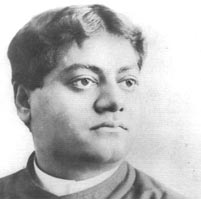 Swami Vivekananda was a close disciple of the great spiritual Master Sri Ramakrishna. After Ramakrishna’s passing, Vivekananda began a whirlwind of activity. He travelled across India, United States and Europe – giving lectures on Vedenta, philosophy and encouraging dynamic action – especially in India. Towards the end of his short life, his hectic schedule told on his health and he retreated to the Himalayas to spend more time in quiet contemplation.
Swami Vivekananda was a close disciple of the great spiritual Master Sri Ramakrishna. After Ramakrishna’s passing, Vivekananda began a whirlwind of activity. He travelled across India, United States and Europe – giving lectures on Vedenta, philosophy and encouraging dynamic action – especially in India. Towards the end of his short life, his hectic schedule told on his health and he retreated to the Himalayas to spend more time in quiet contemplation.
In his final days, he became aware of his limited time left on earth; he was moved to practise more meditation and contemplate on the deepest spiritual truths.
“I am making ready for death. A great tapasya and meditation has come upon me, and I am making ready for death.” – Belur Math, 1902
As his final days came, Swami Vivekananda, a great Vedantist, reveals how his devotion to Mother Kali increased and he began to be more aware of the world beyond this earth of joy and suffering.
For example, he mentioned how he was once distressed at the thought of the ruination and desecration of the Kshir Bhavani temple by earlier Muslim invaders.
Vivekananda thought “How could people have permitted such sacrilege. If I were here I would have laid down my life to protect the Mother.
But, then he heard the Mother speak, and he explained his feelings:
“No more “Hari Om!” It is all “Mother,” now! he said, with a smile. “All my patriotism is gone. Everything is gone. Now it’s only “Mother Mother!”
‘I have been very wrong,’ he said simply, after another pause. ‘Mother said to me, “What even if unbelievers should enter My temples and defile My images! What is that to you? Do you protect ME? Or do I protect you?” So there is no more patriotism. I am only a little child!’
Quotes from – The Last Days
Extracted from Swami Vivekananda on Himself: (at Abe Books)
“If in this hell of a world one can bring a little joy and peace even for a day into the heart of a single person, that much alone is true; this I have learnt after suffering all my life; all else is mere moonshine.”
“I shall never see forty… I delivered my message and I must go… The shadow of a big tree will not let the smaller trees grow up. I must go to make room.”
“If there were another Vivekananda, he would have understood what Vivekananda has done! And yet, how many Vivekanandas shall be born in time!”
“Whenever death approaches me, all weakness vanishes. I have neither fear, nor doubt, nor thought of the external. I simply busy myself making ready to die. I am as hard as that [the pebbles struck one another in his hand]- for I have touched the feet of God.”
“Yes, I come. Nirvana is before me. I feel it at times – the same infinite ocean of peace, without a ripple, a breath.”
“Oh, it is so calm! My thoughts seem to come from a great, great distance in the interior of my own heart. They seem like faint, distant whispers, and peace is upon everything, sweet, sweet peace – like that one feels for a few moments just before falling into sleep, when things are seen and felt like shadows – without fear, without love, without emotion. Peace that one feels alone, surrounded with statues and pictures – I come! Lord, I come!:
“I am the infinite blue sky; the clouds may gather of me, but I am the same infinite blue… These tin pots of bodies and foolish dreams of happiness and misery – what are they?
“Ha! ha!… all is good! Nonsense. Some good, some evil. I enjoy the good and I enjoy the evil. I was Jesus and I was Judas Iscariot; both my play, my fun… Be brave and face everything – come good, come evil, both welcome, both of you my play.”
“If the universe tumbles round my ears, what is that to me? I am Peace that passeth understanding… I am beyond, I am peace.
“I am being lifted up above the pestilential miasma of this world’s joys and sorrows; they are losing their meaning. It is a land of dreams; it does not matter whether one enjoys or weeps; they are but dreams, and as such, must break sooner or later…”
“I cannot be sorry for anything any more. I am attaining peace that passeth understanding, which is neither joy nor sorrow, but something above them both.”
Related

Comments are closed.